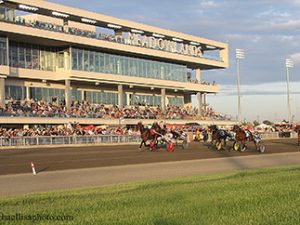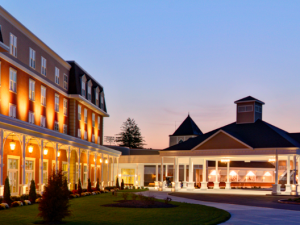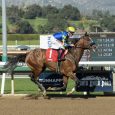By John Furgele

Parx Casino – Photo Courtesy of www.parxcasino.com
If you follow horse racing, you know that casino revenue is a big deal for the sport. Most tracks have some sort of casino on the grounds. Patrons come in, make their bets and a portion of that money is allocated to the sport. Of the roughly 10 percent of the revenues that horse racing receives, 80 percent is used to increase purses.
Last month, Pennsylvania Governor Tom Wolf outlined his proposed budget for the 2020-2021 fiscal year. In it, he wants to take $204 million from those casino dollars and use it to help young Pennsylvanians offset college tuition. Naturally, the horsemen are concerned. They fear that if those dollars are taken away, both horse and harness racing will struggle to survive.
We must remember that this is Gov. Wolf’s proposal. The chance of the current law being changed and that money leaving horse racing is unlikely, but it should give those that run race tracks some pause.
Sooner or later, the sport is going to have to find a way to market, support and sustain itself. It stands to reason that at some point these casino dollars might go the way of the typewriter.
To no surprise, Wolf’s plan brought howls from Pennsylvania horsemen. The rhetoric was what you’d expect ranging from “there would be no casinos if it wasn’t for the horse tracks,” as well as “does the governor know how many people make their living via horse racing?”
Members of the State Horse Racing Commission were quick to pass a resolution opposing the governor’s plan. The state’s Secretary of Agriculture, Russell Redding, pointed out what horse racing does for Pennsylvania’s economy.
“The racing and breeding industry support more than 20,000 jobs, deliver an economic impact of $1.6 billion and preserve open space,” he said.
Farms that are used for breeding and for retired horses could be sold off to developers should purses drop. Bill Hartwell owns a 31-acre farm and buys more than $100,000 annually in hay and other supplies from small businesses in Bucks County. A severe cut in purse money could force Hartwell to put those precious acres up for sale.
“People have invested their hearts and souls into this industry,” Hartwell said, “they spend countless hours raising and racing these horses so they can earn enough money to cover their costs. You can’t just break your commitment to them.”

Parx Casino – Photo Courtesy of www.parxcasino.com
John Servis rose to fame in 2004 when he trained Smarty Jones, the Pennsylvania-bred who won the Kentucky Derby, romped to victory in the Preakness before being caught in the final 100 yards by Birdstone in the Belmont Stakes, finishing an agonizing and heartbreaking second.
Servis has been based at Parx in Bensalem for decades and agrees that taking that money away from racing would have devastating consequences.
“It would devastate not only the horsemen, but the entire agriculture industry,” he said. “If this passes, I will be putting my house up for sale right away.”
Would Servis really do that? Well, given his success, he probably could take his tack to another track, one that benefits from casino revenue, but what about the other trainers at the state’s three thoroughbred tracks and its three harness tracks? They might not be able to just pull up and take off to a state with more money.
These reactions are hardly surprising, but let’s remember that there are many that live in the Commonwealth of Pennsylvania that think businesses like horse racing shouldn’t be propped up by any type of subsidy; that if they can’t make it on their own, then let them go out of business. And, is there anybody in any state that doesn’t want to help offset the high cost of college? We know that many students come out of college, get a job that pays $40,000, yet are saddled with debts in the six figures.
The Philadelphia Inquirer, in an editorial, stated that it’s “about time,” to take money from horse racing to help ease the burden of paying for a college education.
Reports state that there is about $250 million in the casino fund and with Wolf earmarking $204 million for college loan relief. That would leave roughly $50 million for horse racing.

Meadowlands Racetrack – Photo Courtesy of www.TheBigM.com
Wolf pointed to New Jersey, which gives horse racing a $20 million annual subsidy for its three racetracks–Monmouth (thoroughbreds) and the Meadowlands and Freehold on the harness side. Since receiving the subsidies, racing bounced back nicely last year in the Garden State and thus
far, 2020 is off to a solid start. Wolf may be thinking that Pennsylvania horse racing needs some money, but perhaps not $200 million?
Whether Wolf’s proposal ever becomes law, now is a good time for horse racing to take a long, hard look at itself, something they haven’t always been good at. They see the mirrors, but often, they choose to run past them. In a way, it’s the ultimate procrastination.
For too long, tracks have watched people come to their grounds; head right into the casino and spend their discretionary income. They didn’t have to care, because the track knew that they were getting a cut of every dollar that was inserted into video blackjack, roulette or at some tracks, table games.
The results were good; the casinos were making money and they were giving some of that to the tracks, who in turn, would raise purses and attract a higher quality of horse, driver/jockey and trainers. All they had to do was open the doors and watch the people come in to gamble.
The racing wasn’t ignored, but it was an afterthought. If you’ve ever seen a commercial for a casino that is attached to a horse or harness track, you see pictures of gorgeous men and women, smiling, laughing and having the times of their lives—at gambling stations, never at the races.
Saratoga Casino Hotel — the name says it all — has a harness track; in fact, 2020 marks its 79th season of racing, but when you see the commercials, it’s all those models having all that fun in the casino. There wouldn’t be a casino if not for harness racing, but yet there is no mention of racing in the name.
The thoroughbred tracks market a little better, but that’s not saying much. When the big races come to a track, you’ll hear some promotion, but for the most part, it’s crickets.
Some believe that there will be an endless supply of casino money and as long as people are frequenting them, the racing is nothing more than a diversion. And anytime someone mentions taking some of that casino money to use for marketing, the horsemen howl some more. They want all the revenue to be used to boost purses.
You certainly can’t blame them. If Yonkers has 11 races with total purses of $292,500 why would they want to give up some of that to better market the sport? Even if five percent is used for marketing, that’s $14,625 that’s taken away from the horsemen; something they don’t want.
But what if Wolf’s proposal becomes a bill and is passed by the Pennsylvania General Assembly? What would the tracks do? They likely wouldn’t close, but purses would drop, leading to a possible exodus of quality horses, jockeys, drivers and trainers.

Saratoga Casino Hotel – Photo Courtesy of www.saratogacasino.com
The time to act is now. It’s easy to say that the sport needs to market itself better, but marketing is much more complex than ever. Young people consume content much more differently than people that were born in the 1960s and 1970s. They don’t watch TV and if they do, they don’t watch commercials, which mean they’re not seeing the spots for a Saratoga Casino Hotel.
For years, horse racing has relied on minimal advertising, choosing to sit back and watch people patronize the casino. If you’ve been to a casino at a harness track, the crowd in the casino is usually robust while the crowd at the track is sparse with most being over the age of 50.
Gov. Wolf’s plan may be nothing more than a threat, but it should serve as a warning for everybody involved in horse racing. It’s time to come up with a vision to keep the sport moving forward.




